Ukrainian Artists Invited to Perform in New Production of Tosca in National Theatre in Zagreb
March 11th, 2022 - An announcement from the theatre states that they stand in solidarity with artists from Ukraine and consider it an obligation to provide an opportunity to Ukrainian colleagues to continue their artistic work.
The Croatian National Theatre in Zagreb recently cancelled a production of Eugene Onegin, an opera by Tchaikovsky whose premiere was scheduled for May 2022. Instead, the theatre will stage one of the most famous operas in history, Puccini’s Tosca, directed by Mario Pontiggio. The premiere is scheduled for May 27th, writes Jutarnji list.
Ukrainian conductor Alla Kulbaba from the National Opera in Kiev has been invited to orchestrate the performances in Tosca, and Ukrainian soloist Oksana Kramareva is also expected to perform. The Croatian National Theatre stated in their announcement that they ‘stand in solidarity with artists from Ukraine and consider it an obligation to provide an opportunity to Ukrainian colleagues to continue their artistic work’.
Widely known as one of the most spectacular operas ever written, the new production of Tosca will feature performances of opera singers Tomislav Mužek, Luciano Batinić and Valentina Fijačko Kobić of the Croatian National Theatre in Zagreb, and Kristina Kolar of the Croatian National Theatre Ivan Zajc in Rijeka.
The Zagreb theatre originally planned for the opera Eugene Onegin by Tchaikovsky to be produced by a creative team from Russia, namely Mikhail Sinkevich, conductor of the Mariinsky Theatre, and director Yuri Laptev, Putin's former cultural adviser and holder of the title of People's Artist of the Russian Federation. In view of the war in Ukraine, the Croatian National Theatre in Zagreb cancelled the plans they’ve been working on for the last year, envisaged as a project bringing renowned Russian artists to stage Pushkin's famous work in Zagreb.
An Overview of Zagreb Summer Festivals: 5 Reasons You Should Visit in 2021
May 27, 2021 - Although Zagreb often gets overlooked in favour of some of the more famous Croatian summer destinations, the capital of Croatia deserves to be more than a brief stopover on your way to the coast. Here are the Zagreb summer festivals you don't want to miss in 2021.
Murtić100, May 25 - July 18
Marking the centenary of the birth of Edo Murtić, one of the most influential modernist painters in southeast Europe, the exhibition Murtić100, which will feature more than 200 Murtić's paintings, takes place at Home of Croatian Artists (colloquially known as Meštrović Pavillion). Meštrović Pavillion is open for visitors every day from 11 a.m. to 9 p.m.
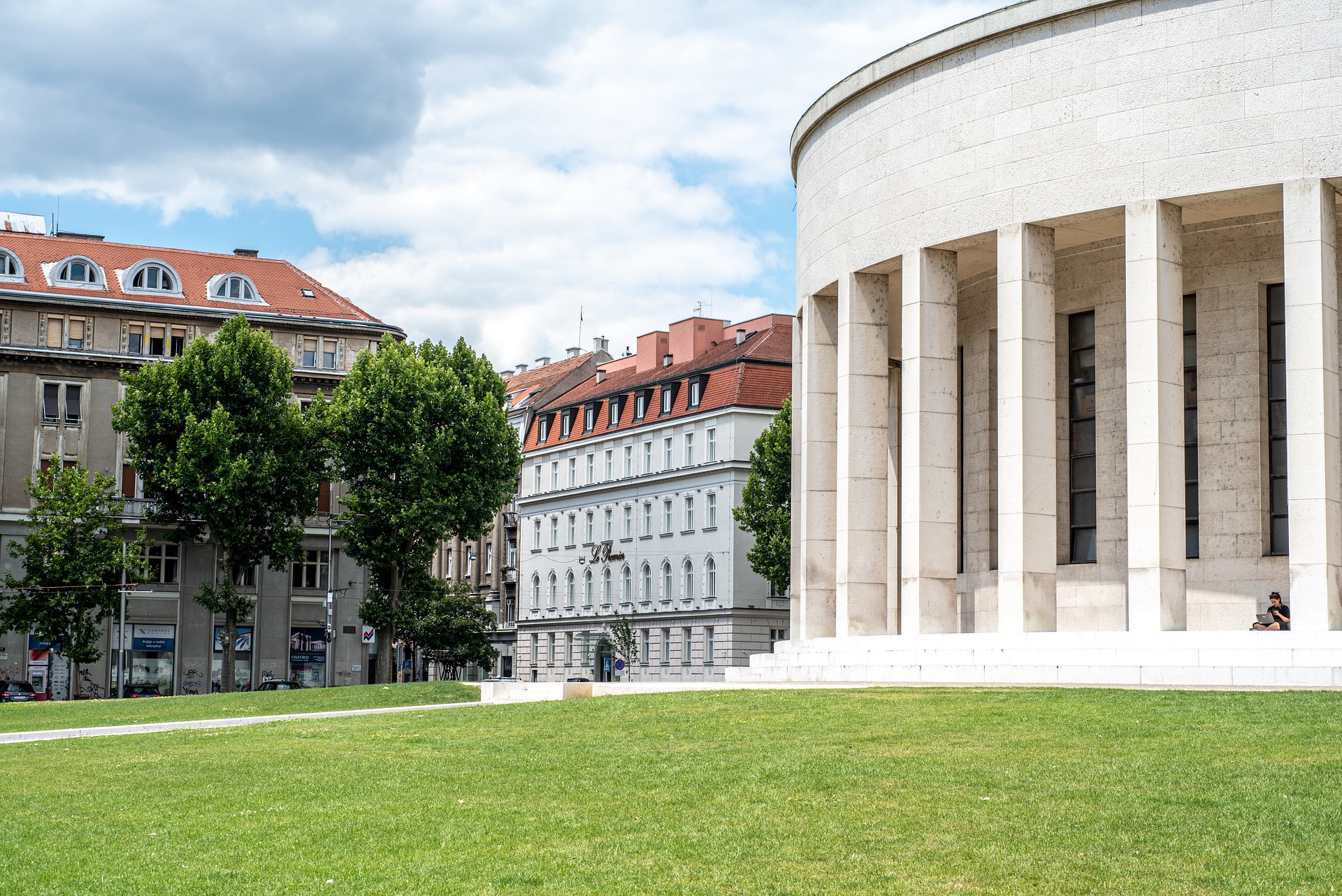
Meštrović Pavillion (right) /Pixabay
European Short Story Festival, June 6 - June 11
This year marks the 20th anniversary of the European Short Story Festival (Croatian: Festival europske kratke priče - FEKP). To celebrate the occasion, this years' festival will also have two additional locations - Hvar Town on Hvar and the town of Vis on Vis. Holding the important title of one of the first short story festivals in Europe, European Short Story Festival thus far hosted more than 70 writers from 15 European countries and served as an inspiration for International Short Story Festival in Wroclaw, Poland. This year, the Festival will connect with authors from the other side of the pond - the internationally recognized Siri Hustvedt and Paul Auster. For more details, follow the Festival's official Facebook Page.

Pixabay
ZagrebDox, June 13 - June 20
This year's 17th edition of the International Documentary Film Festival ZagrebDox takes place at Zagreb Student Centre and Tuškanac Open Air Cinema. The programme is divided into 8 sections - State of Affairs, Controversial Dox, Masters of Dox, Teen Dox, Thriller Dox, and Love, along with two retrospective programmes - one dedicated to Croatian female documentary directors, the other to the Swiss theatre and film director Milo Rau. With 80 short and feature-length titles to choose from, ZagrebDox promises to give an overview of the finest works the documentary film world has to offer.

Pixabay
Grič Evenings, July 1 - July 15
Lovers of classical music are in for a treat! For a whole fortnight, starting July 1, just as the dusk begins to settle, Atrium of Klovićevi Dvori in Zagreb's Upper Town will be filled with the sounds of music commemorating the 40th Grič Evenings. We are looking forward to the programme announcement.
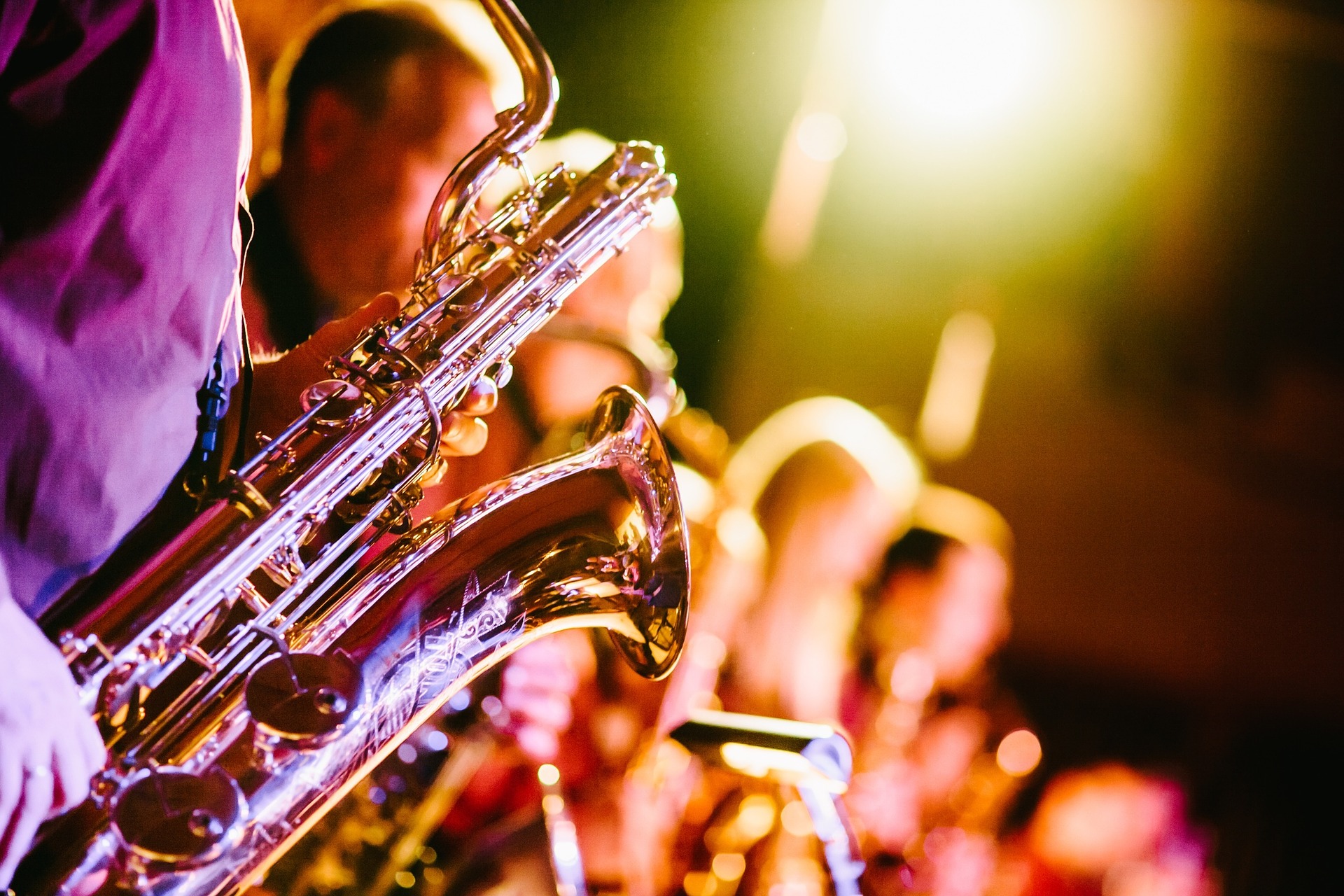
Pixabay
Croatian National Theatre Summer Evenings, May 29 - July 3
The Croatian National Theatre in Zagreb hosts an 'open-air' programme on the Republic of Croatia Square (Croatian: Trg Republike Hrvatske), right next to the Croatian National Theatre building.
The programme will open on May 29 with a concert to mark Statehood Day and Zagreb City Day, respectively. Visitors will get a chance to watch excerpts from some of the most famous operas such as Barber of Seville and The Marriage of Figaro, as well as the ballets The Swan's Lake and Giselle, the choreography of the latter having been developed by the champion of the Paris Opera Ballet, José Carlos Martínez.
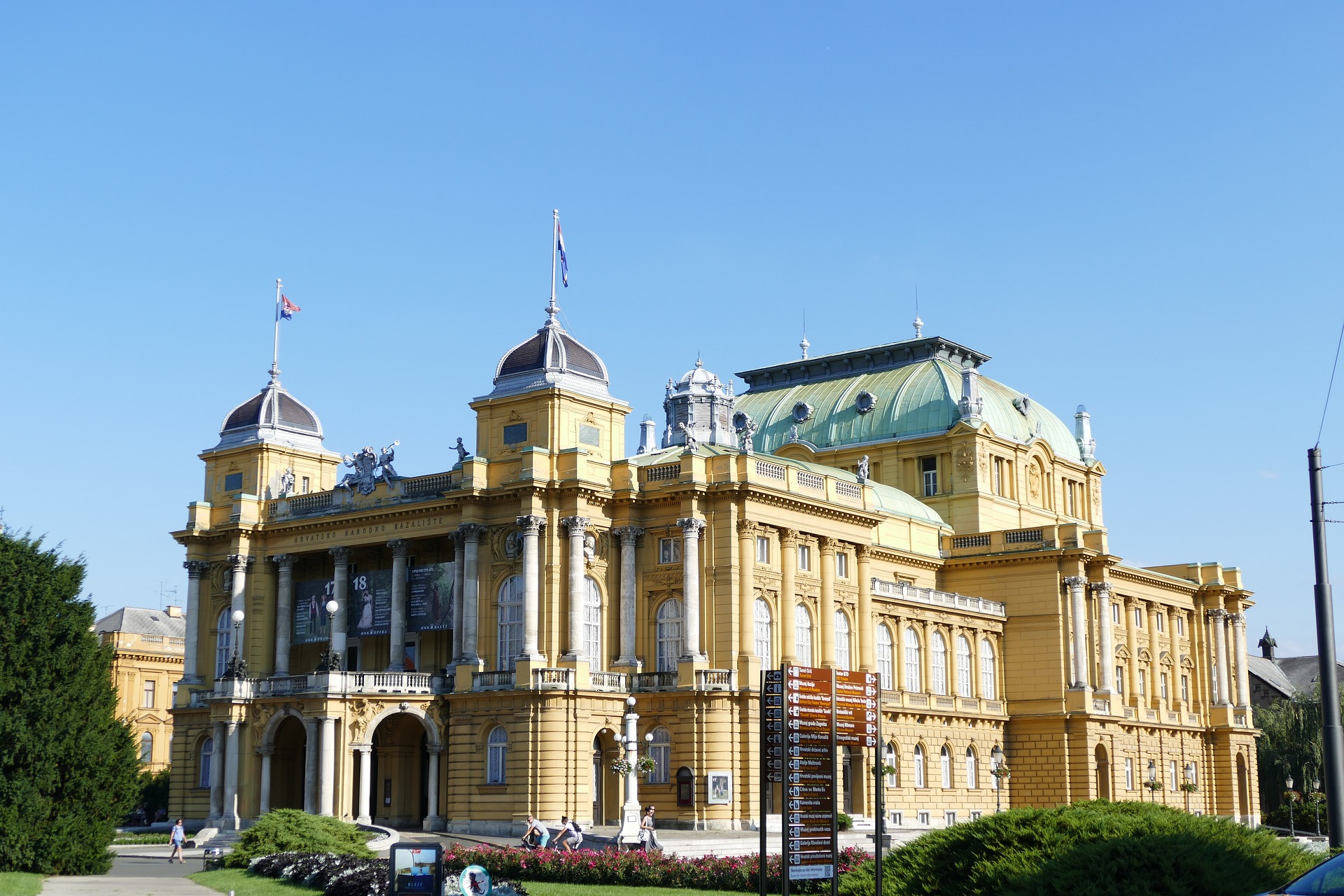
Croatian National Theatre/Pixabay
And there you have it - there are at least 5 reasons to extend your stay in Zagreb and discover its vibrant spirit!
For more on travel in Croatia, follow TCN's dedicated page.
Opera Singers to Help in Post-COVID Rehabilitation
ZAGREB, 5 March, 2021 - Several professional opera singers on Friday launched the "Breathe" campaign to help as of 8 March in the rehabilitation of people who have recovered from COVID-19 but still have difficulty breathing.
The initiative came from Croatian National Theatre (HNK) Zagreb singers Ljubomir Puškarić, Adela Golac Rilović, Ivana Lazar, Ivica Trubić, Tomislav Mužek, Luciano Batinić, Tvrtko Stipić and Ozren Bilušić, and HNK Osijek singers Martina Puškarić and Berislav Puškarić, Ljubomir Puškarić said on Friday, adding that singers from all of Croatia were joining the initiative.
Puškarić said a Facebook group was created for everyone who had experienced serious COVID-19 symptoms and had difficulty breathing even after recovering.
He said those joining the group would obtain information on breathing exercises used by opera singers and be able to work with instructors, all professional operas singers, based on one-on-one online consultations.
To begin with, each participant will get at least one session a week in agreement with an instructor. The therapy is planned to last six weeks. The idea comes from England and a survey has shown that the psychophysical condition of persons working with opera singers has improved.
Marija Ruzicka Strozzi Park: Zagreb Savica Park Future Secured By Renaming
November 6, 2020 – With its renaming as Marija Ruzicka Strozzi Park, the much-loved area of neighbourhood greenery has secured its future. We look at the internationally-famous actress, Marija Ruzicka Strozzi, who lends the park her name
The Zagreb neighbourhood of Trnjanska Savica is not without greenery. Sitting next to Novi Zagreb, it shares some of the same functional, socialist architecture and town planning. Thus, the larger apartment buildings in its east all lie on pretty, tree-lined avenues, as do the smaller residential properties in its west. More commonly referred to as simply Savica, the hood's southerly border is the great Sava river. Residents stroll or walk their dogs along its banks. Savica is a nice place to live.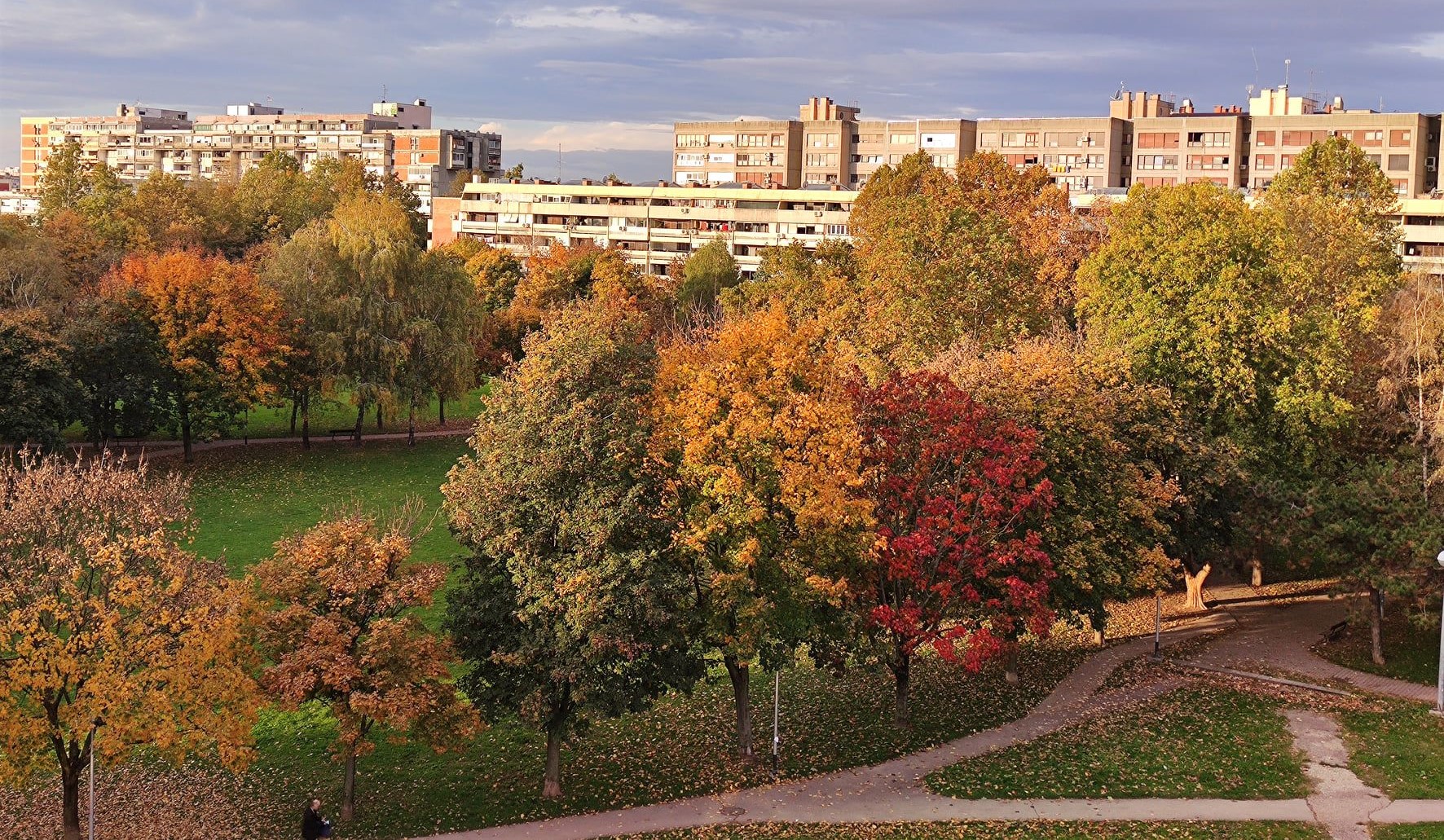 Marija Ruzicka Strozzi Park, Savica, Zagreb in all its autumnal glory
Marija Ruzicka Strozzi Park, Savica, Zagreb in all its autumnal glory
When dog walkers, riverbank runners and Savica residents with a south-facing balcony look across the Sava, their vista is filled with the great expanse of Bundek Park. It is the largest city park south of the river. Savica's own park is smaller, less spectacular. But, by the people who live here, it is no less loved. Watched over by protecting residents, the park this looks to have secured its future with its official renaming as Marija Ruzicka Strozzi Park.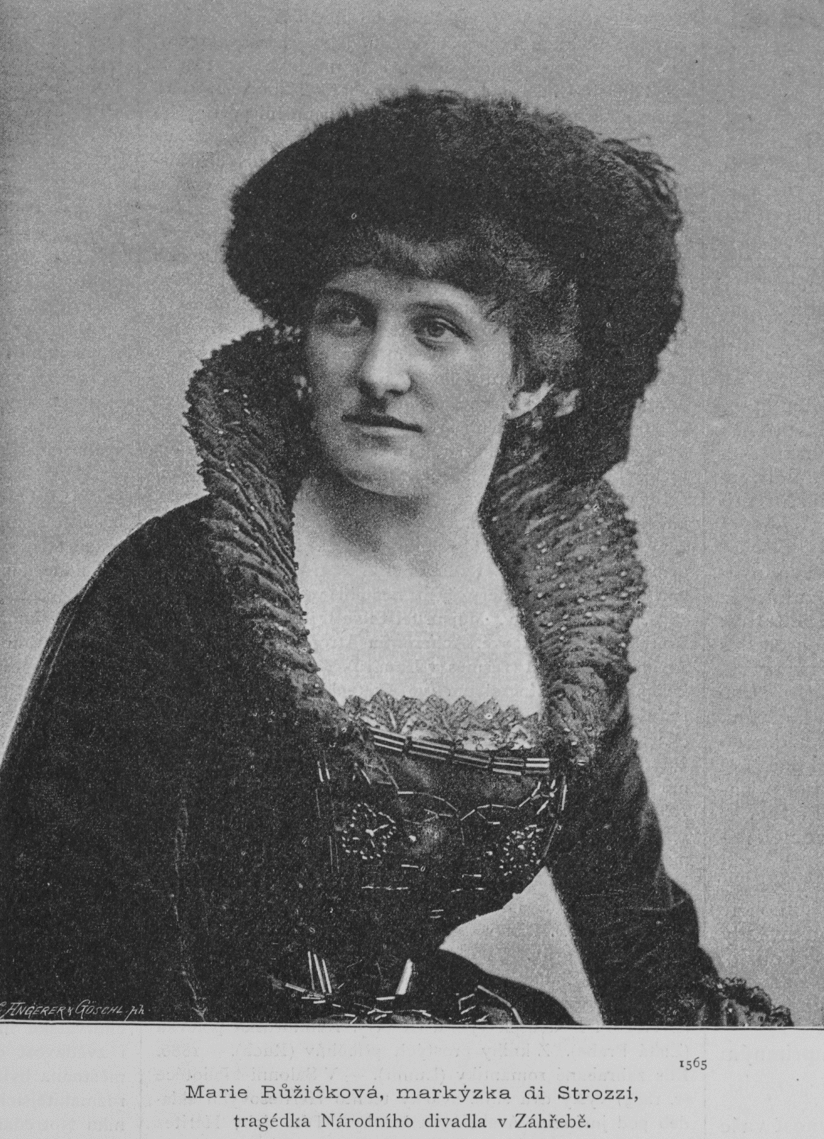 © Institute of Czech Literarture
© Institute of Czech Literarture
Today, the name of Marija Ruzicka Strozzi is heard much less frequently than it was at the height of her fame, towards the end of the 19th century and the beginning of the next. But, back then, it was a name known across the whole of Europe. One of the pre-eminent actresses of her generation, this Zagreb resident was described by the most-widely read Parisian weekly newspaper of the time as the greatest tragedy performer in all of the Slavic South. She gave celebrated performances in Brno, Prague, Sofia, Ljubljana, Sarajevo, Mostar, Cetinje, Belgrade, Nis, Kragujevac and was such an integral part of the theatre in her home city of Zagreb, that she is the only performer ever to have had their statue placed within the Croatian National Theatre Zagreb during their own lifetime.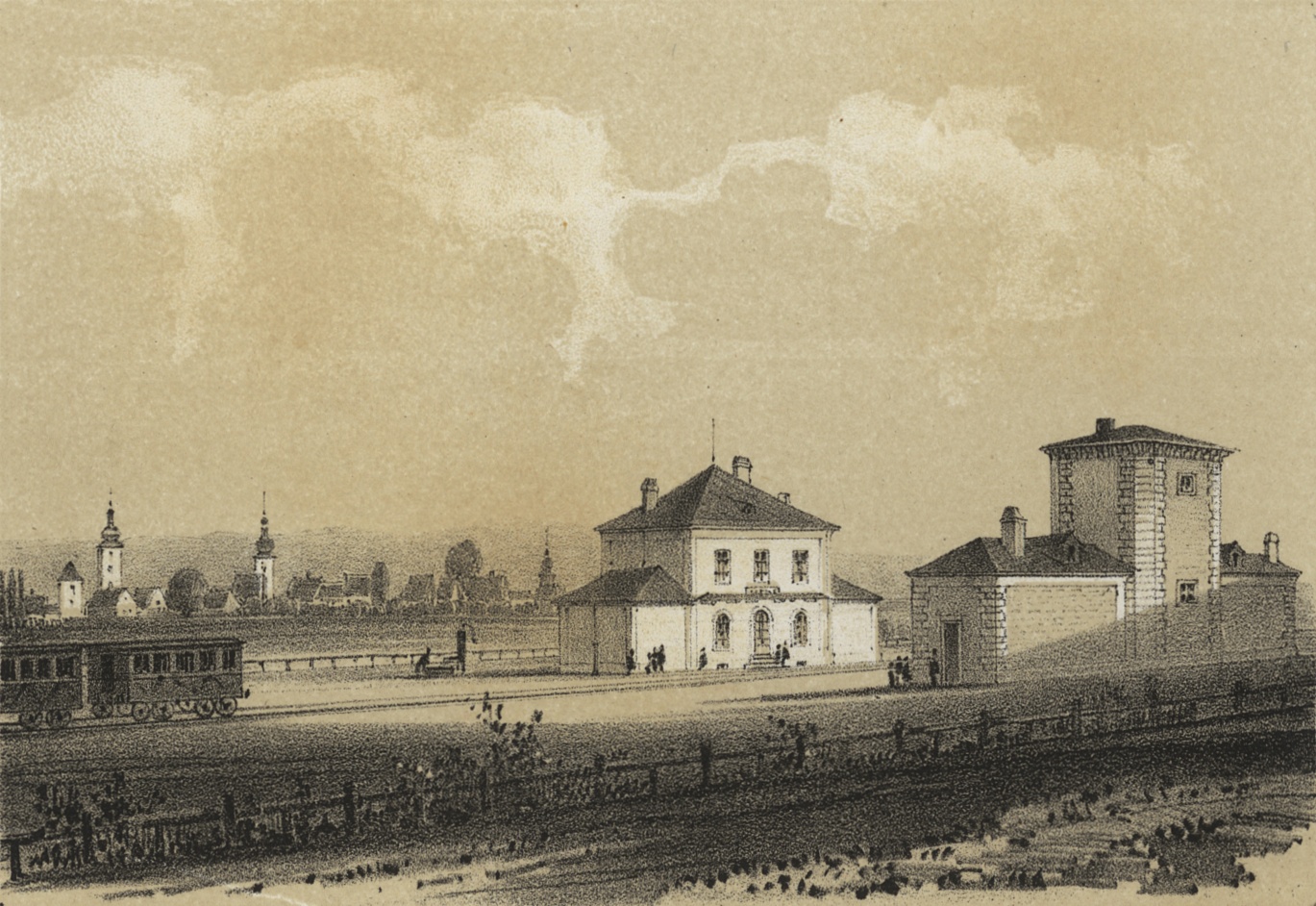 Litovel in today's Czech Republic, painted in 1845, just five years before the birth of Marija. It was then part of the Austrian Empire, whose state railway is here depicted © Ludwig Förster (1798-1863), Amédée Demarteau - FÖRSTER, Ludwig.
Litovel in today's Czech Republic, painted in 1845, just five years before the birth of Marija. It was then part of the Austrian Empire, whose state railway is here depicted © Ludwig Förster (1798-1863), Amédée Demarteau - FÖRSTER, Ludwig.
Marija Ruzicka Strozzi was born in 1850 in the Moravian town of Litovel, then part of the Austrian Empire, today within the Czech Republic. So pleased was he at his daughter's birth that Marija's musician father, Leopold Ruzicka, went to the local inn to celebrate. There, he met fellow Moravian Josip Freudenreich. It was a chance encounter - Freudenreich was only visiting, his current place of residence was Zagreb where he was an actor with the city theatre. The two struck up a friendship over several days and Freudenreich was happy to recommend his friend to the theatre director for a role with their orchestra. Aged just four months, Marija Ruzicka Strozzi and her family moved to Zagreb.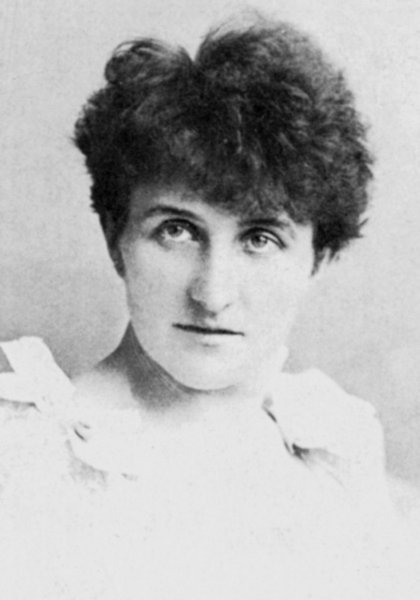
Leopold served four years in the orchestra of the Zagreb theatre but, struggling to feed the family on a musician's wage, he opted to accept the offer of a clerk's position in Varaždinske Toplice. The family moved there, but after Marija finished high school and following the tragic death of Leopold aged just 30, her mother took Marija back to Zagreb and enrolled her in a Catholic German high school.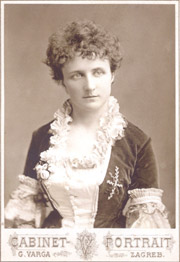
Marija had begun singing and acting as a child and continued to do so at convent ceremonies. In 1865, her mother sent Maria on a singing course at Zagreb's Music Institute where she was marked as potential for the Vienna Conservatory. Sadly, Marija damaged her voice, ending the opportunity. However, luck would visit the Ruzicka family for a second time in the form of Josip Freudenreich. By 1867, Freudenreich was himself manager of the Zagreb theatre and invited Marija to audition. She made her debut on January 2 the following year, commencing the longest-running career of any actress from the region. She spent almost 70 years playing around six hundred roles over several thousand performances.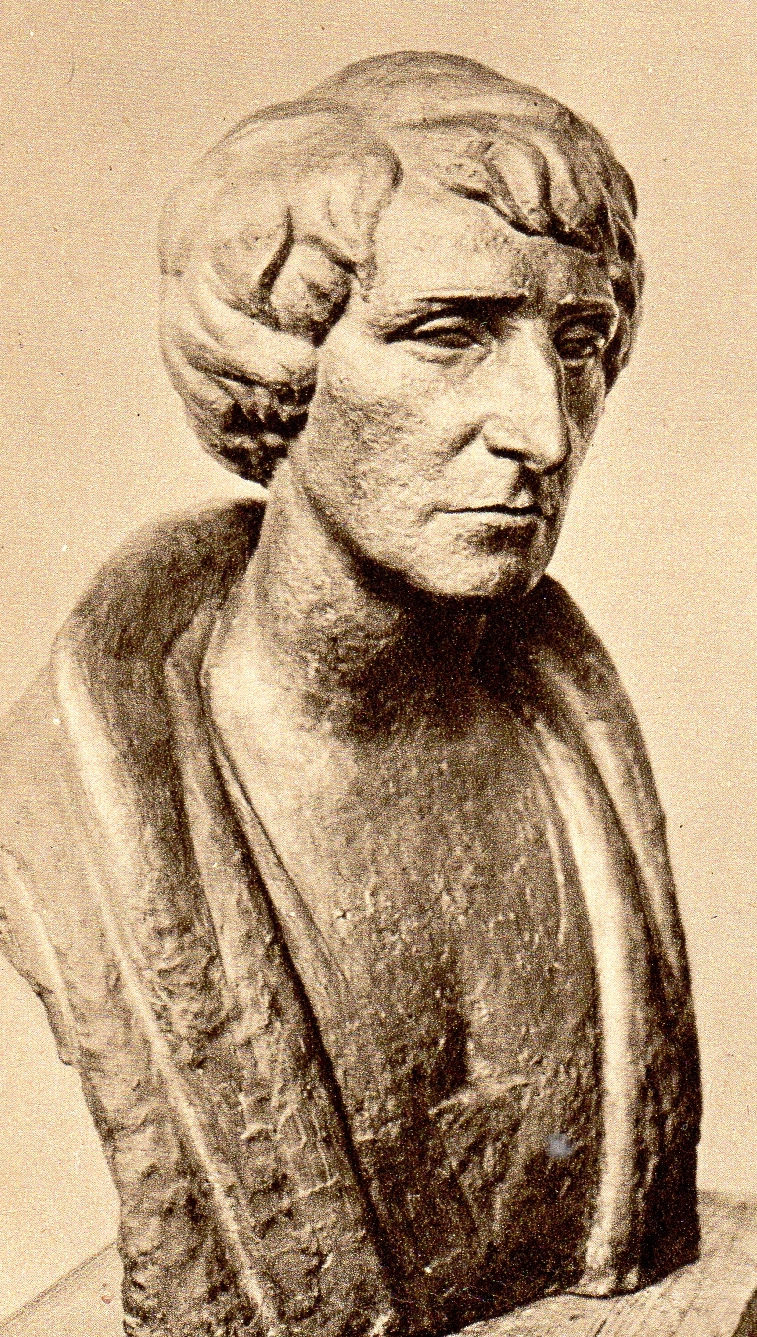 One of the statues of Marija that can be seen at the Croatian National Theatre Zagreb
One of the statues of Marija that can be seen at the Croatian National Theatre Zagreb
In addition to the German language, Marija began learning French as a young actress to give her a better perspective on the texts and roles she learned. Of course, she also spoke Croatian and mostly performed using this language, even under threat of violence (Italian nationalists in Zadar warned her against using her mother tongue on the city theatre stage - she ignored them).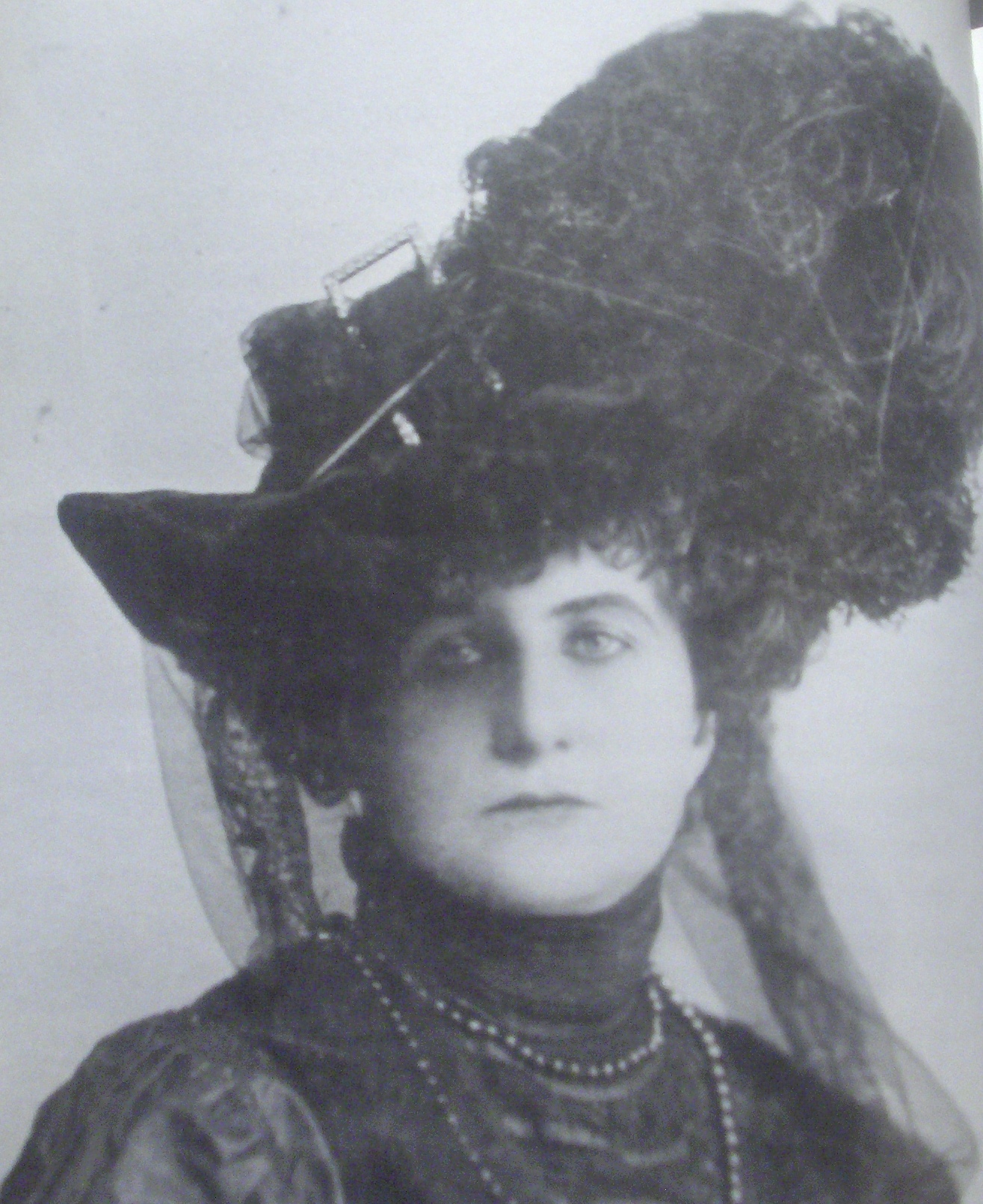 This picture of Marija was the source for a commemorative stamp issued by the Croatian Post
This picture of Marija was the source for a commemorative stamp issued by the Croatian Post
Marija spent all of her life in Zagreb, except for a small period in 1878 when she appeared as a guest star in Vienna while Zagreb performers were on strike. So delighted were the Vienna Burgtheater with her performance that they offered Marija a permanent position. She turned them down, recounting afterward in her diary “My life is hard, but I would never leave Zagreb. I am here and I stay here even though I and my children are in trouble, especially in the winter in a cold room when I learn roles at night.”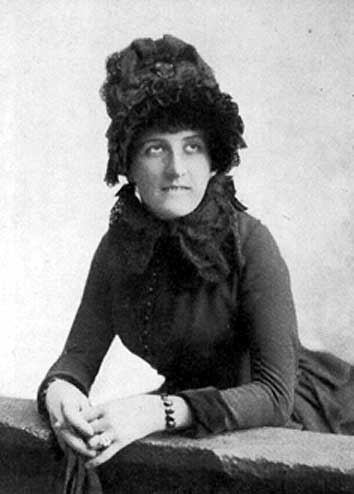
At the beginning of her career, Marija Ruzicka met Ferdinand Strozzi and married him in 1871. They had eight children together, Marija wrapping herself in corsets in order to continue performing while pregnant. Sadly, only three of her children survived, but two of them made a significant mark on Croatian culture. Marija's daughter Maja Strozzi Pečić was a world-famous opera singer and her son Tito Strozzi was a prominent actor and theatre director. Subsequently, Maja Strozzi gave birth to a son, Boris Papandopulo who would become a renowned composer, and the granddaughter of Tito Strozzi and his wife, actress Eliza Gerner, is the actress Dora Fišter Toš. Sadly, in 1905 Ferdinand Strozzi died during a visit to Sofia. At his funeral, Ferdinand's son Tito walked behind his father's coffin alongside Miroslav Krleža, the two thirteen years olds inseparable as best friends.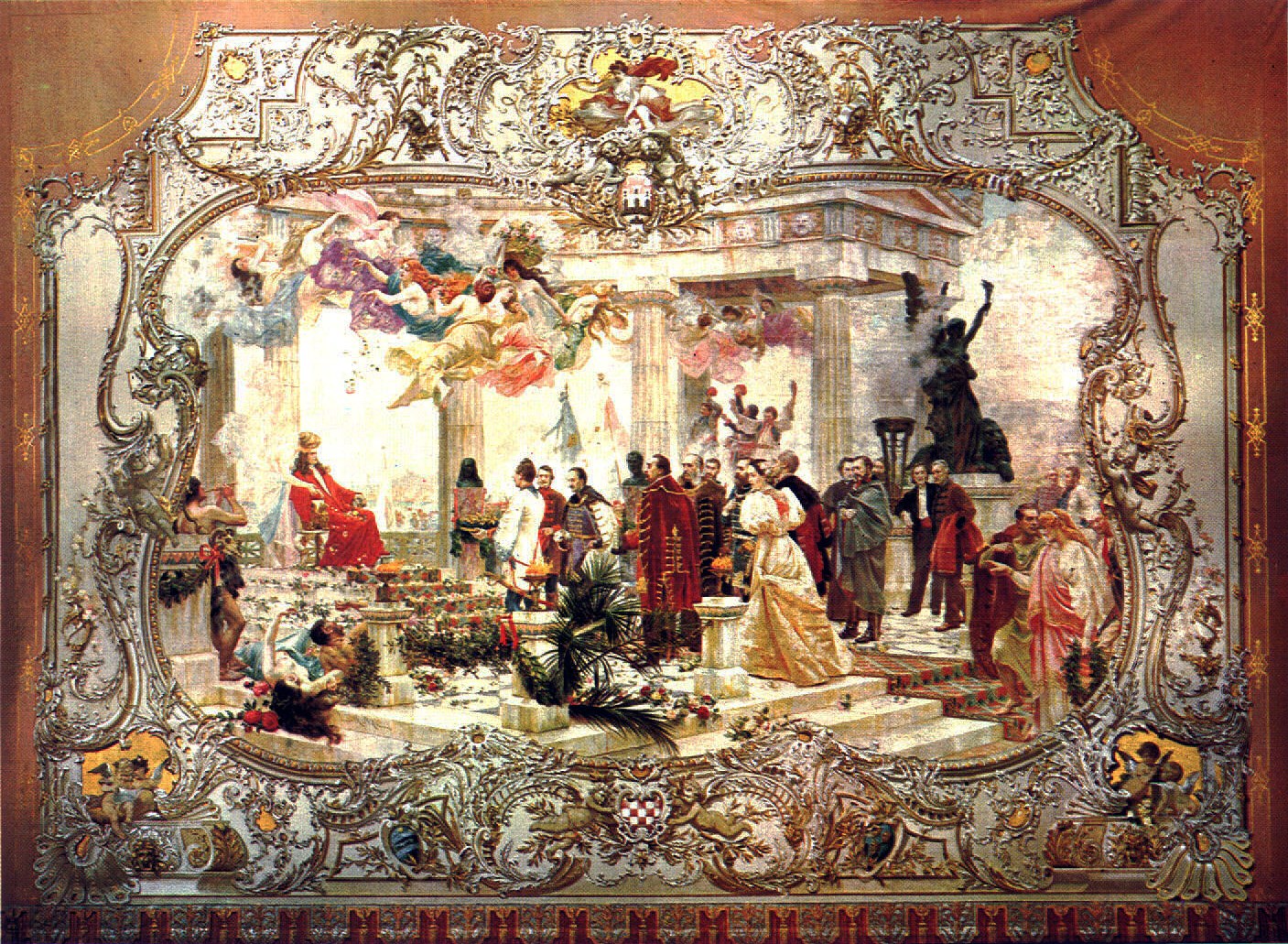 Vlaho Bukovac's Illyrian Revival curtain for the Croatian National Theatre Zagreb in which Marija is depicted © Croatian National Theatre Zagreb
Vlaho Bukovac's Illyrian Revival curtain for the Croatian National Theatre Zagreb in which Marija is depicted © Croatian National Theatre Zagreb
Marija Ruzicka Strozzi spent an uninterrupted 68 years as a leading actor. By 1896 she had been recognised as such a significant talent that she was depicted by famous Croatian artist Vlaho Bukovac on his Illyrian Revival curtain for the Croatian National Theatre Zagreb. In 1918, she was celebrated at the theatre on the 50th anniversary of her career and again in 1928 on the 60th. On the 65th anniversary of her work, she received a statue in the Croatian National Theatre, where today you can find two statues of Marija Ruzicka Strozzi. She played her final roles in 1936 in Tolstoy's Resurrection and in Border Guards, often regarded as the first Croatian folk play - it had been written back in 1856 by the old Ruzicka family friend, Josip Freudenreich.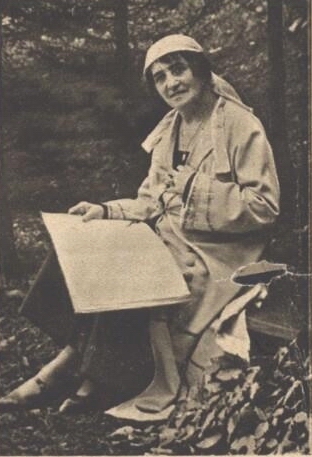
Marija pictured in 1928
Marija Ruzicka Strozzi died on 27 September 1937. Having made such a significant contribution to the culture of Zagreb over so many years, her funeral procession from the Croatian National Theater to Mirogoj cemetery drew thousands. Although her son Tito Strozzi and her grandson Boris Papandopulo already have streets named after them, it is not until the naming of the Savica park that Marija Ruzicka Strozzi has been recognised in her home city with the assigning of her name to a public place.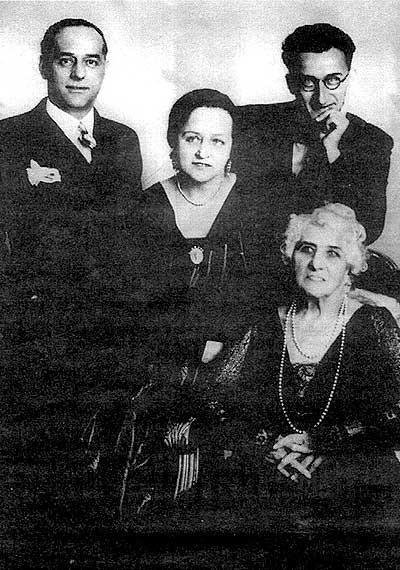
Marija and her children
In doing so, Zagreb not only pays tribute to one of the greatest acting talents ever to have come from the city, but it also safeguards the future of the Savica neighbourhood's central park. For generations to come, families and children will enjoy its greenery and learn the name of the great Marija Ruzicka Strozzi.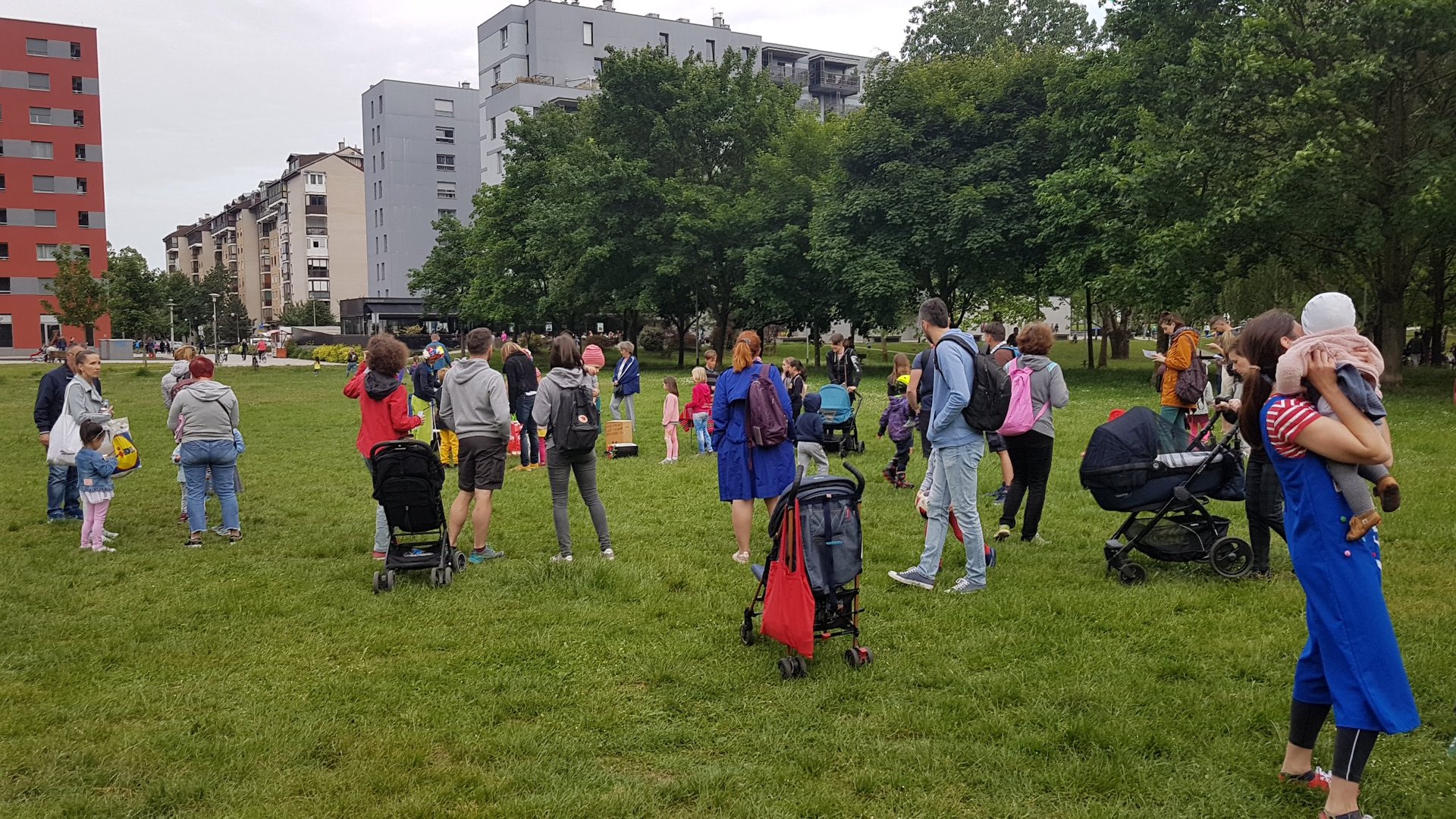 Marija Ruzicka Strozzi park is a popular place for recreation, social activities and meeting for all ages of Savica residents and their guests
Marija Ruzicka Strozzi park is a popular place for recreation, social activities and meeting for all ages of Savica residents and their guests
All colour photographs © Savica za Park, all uncredited photographs lie within the public domain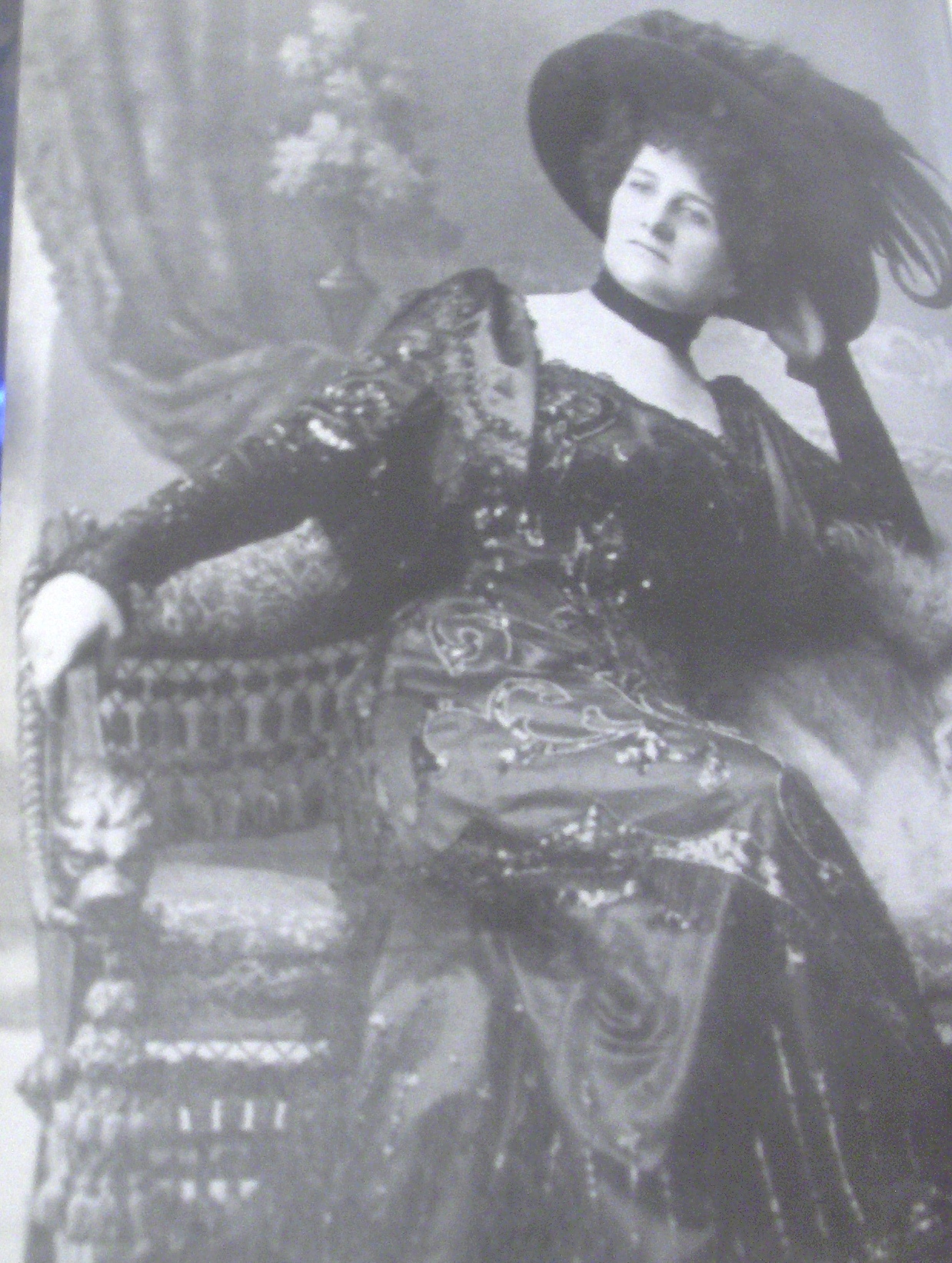
For the latest travel info, bookmark our main travel info article, which is updated daily.
Read the Croatian Travel Update in your language - now available in 24 languages
Experts Call on Minister to Protect HNK
ZAGREB, Oct 13, 2020 - A group of experts has called on Culture Minister Nina Obuljen Korzinek and the Zagreb city authorities to do something about disorderly gatherings of young people outside the HNK (Croatian National Theatre) and protect the city's cultural heritage and enable dialogue between different social groups.
"The HNK and the surrounding area has become a place of nightly gatherings of young people... some of whom are active perpetrators of violence who are noisy, who smash things, throw up and urinate on and around the HNK building while others ignore it, minding their own business," the group, called "Let's Renew Zagreb", said in a statement.
All of this happens without any municipal control or police intervention, they say, stressing that squares are not zones where spontaneous gatherings are banned.
Noting that the square where the HNK is located was a place of spontaneous gatherings in the early 1980s, they say that at the time there was municipal order and a sense of the importance of the city's cultural heritage.
"The national theatre - the HNK - has now become a disgrace and a public toilet," the group says, noting that municipal services and police as well as political stakeholders at the city and national levels, had completely failed with regard to control and facilitation of nightly gatherings outside the HNK.
It calls on the minister to find, in cooperation with the city department for culture, appropriate locations where citizens will be able to gather and have fun outdoors without destroying a centuries-old cultural setting and hurting other citizens' feelings.
For the latest travel info, bookmark our main travel info article, which is updated daily.
Read the Croatian Travel Update in your language - now available in 24 languages.
PHOTOS: Before & After - How HNK Afterhours Lost Its Cool
ZAGREB October 13, 2020 – Since early June 2020, the Croatian National Theatre Zagreb has served as a nightly meeting point for the city's youths. In these pictures and video we see the incredible youth phenomenon as it once was and also how HNK afterhours lost its cool
Built in 1895, the Croatian National Theatre Zagreb (HNK Zagreb) is one of the finest pieces of architecture in a city not short on fine Austro-Hungarian buildings. Sitting in the middle of Republic of Croatia Square, it is the focal point of Lower Town. A multi-purpose space, it has world-class opera and ballet companies in-house. © David Bakarić
© David Bakarić
This week, several media outlets have reported on the gathering of youths outside the theatre, especially on weekend nights. While an interesting read, including the thoughts of a sociologist, these stories are a bit out of date. Because the truth is, the party is over - HNK afterhours lost its cool many weeks ago.
BEFORE © Marc Rowlands
© Marc Rowlands
In early June, when the three-month Coronavirus lockdown finally ended, HNK Zagreb became the de facto meeting point for Zagreb youth. It all happened rather spontaneously. There were no advertisements. Word spread from peer-to-peer and young people from as far away as Rijeka, Ivanic-grad and Zabok made the journey to take part in the youth culture phenomenon. © David Bakarić
© David Bakarić © Marc Rowlands
© Marc Rowlands
It was a joyful scene - thousands of people from every youth tribe imaginable; punk and metal fans, sports students, classical musicians, football fans, young patriots, LGBT teens, devout Christians and kids who would usually go to the cajke (folk music) club sat side-by-side. It was good-natured. Everyone was glad to be out of the house and be able to meet their peers. Everyone got along. © David Bakarić
© David Bakarić © David Bakarić
© David Bakarić © David Bakarić
© David Bakarić © David Bakarić
© David Bakarić
Impromptu theatre performances and music concerts took place. Soundsystems were set up. There was laughter, music, dancing and all round good cheer. © David Bakarić
© David Bakarić © David Bakarić
© David Bakarić
'We are extremely happy and positive that our theatre has been recognized as a place of gathering and sharing positive vibrations between generations,' an official from the Croatian National Theatre Zagreb told this journalist when approached to comment on HNK afterhours. 'Ever since 2014, our hope was to create a warm and welcoming feeling here for everybody, for all age groups and different audiences; to make theatre alive outside the building walls.' Responsible young partygoers cleaned up after themselves in early June. Those cool kids have long since disappeared from HNK afterhours © David Bakarić
Responsible young partygoers cleaned up after themselves in early June. Those cool kids have long since disappeared from HNK afterhours © David Bakarić
AFTER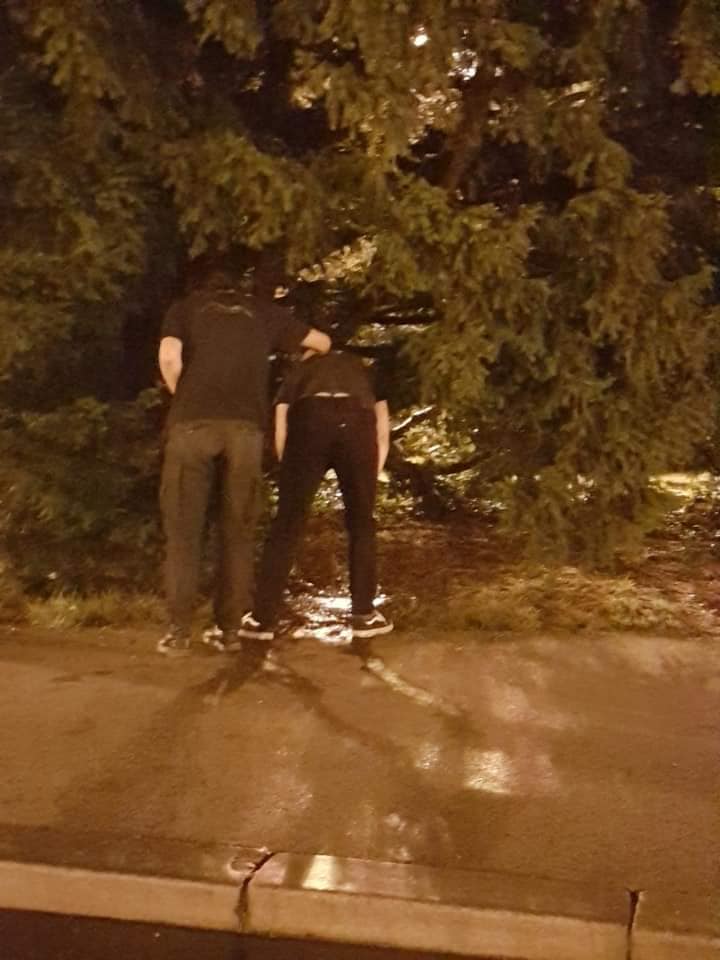
HNK afterhours lost its cool many weeks ago. Becoming an expected rather than a spontaneous gathering was perhaps its death knell. That, and the fact that although everyone knew hundreds were gathering there, no provisions were made for these socialising young people. With no other option on Republic of Croatia Square, the bushes and gardens around the theatre became their toilets.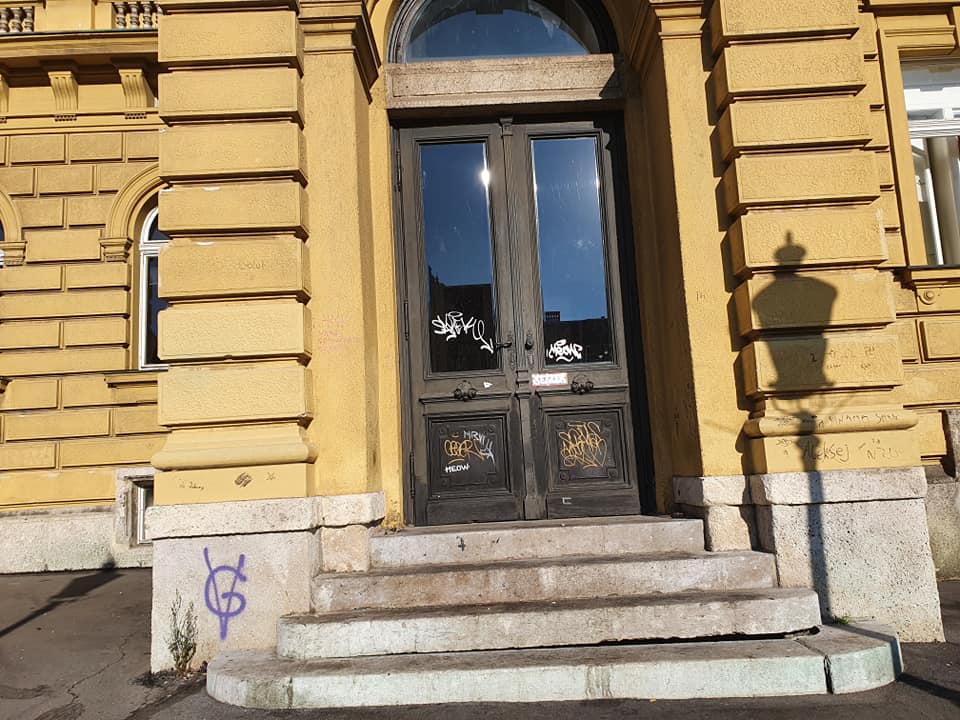
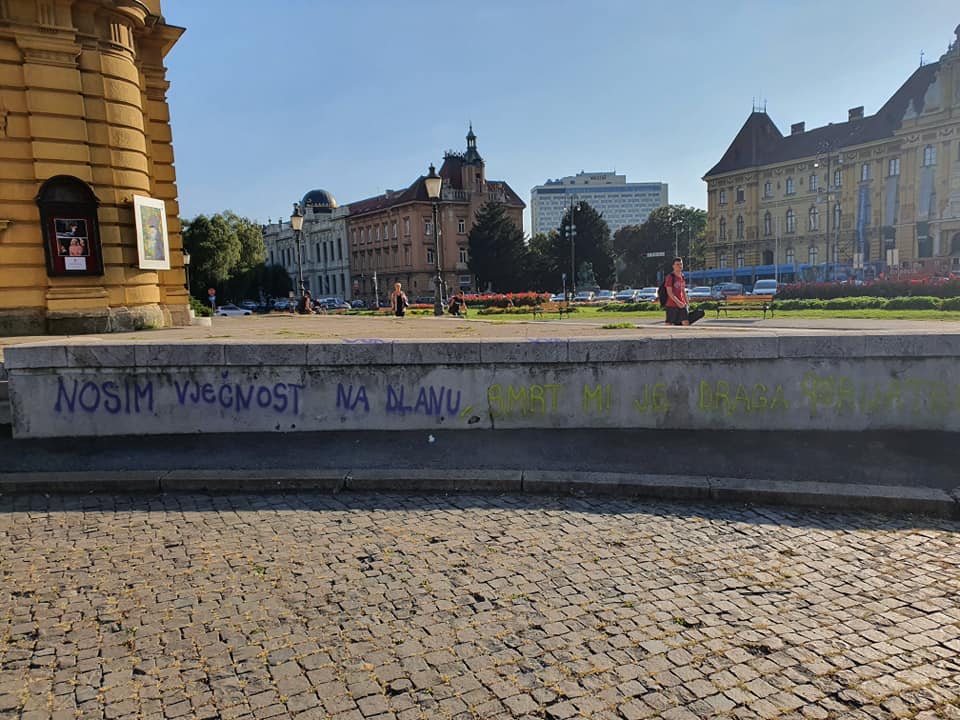
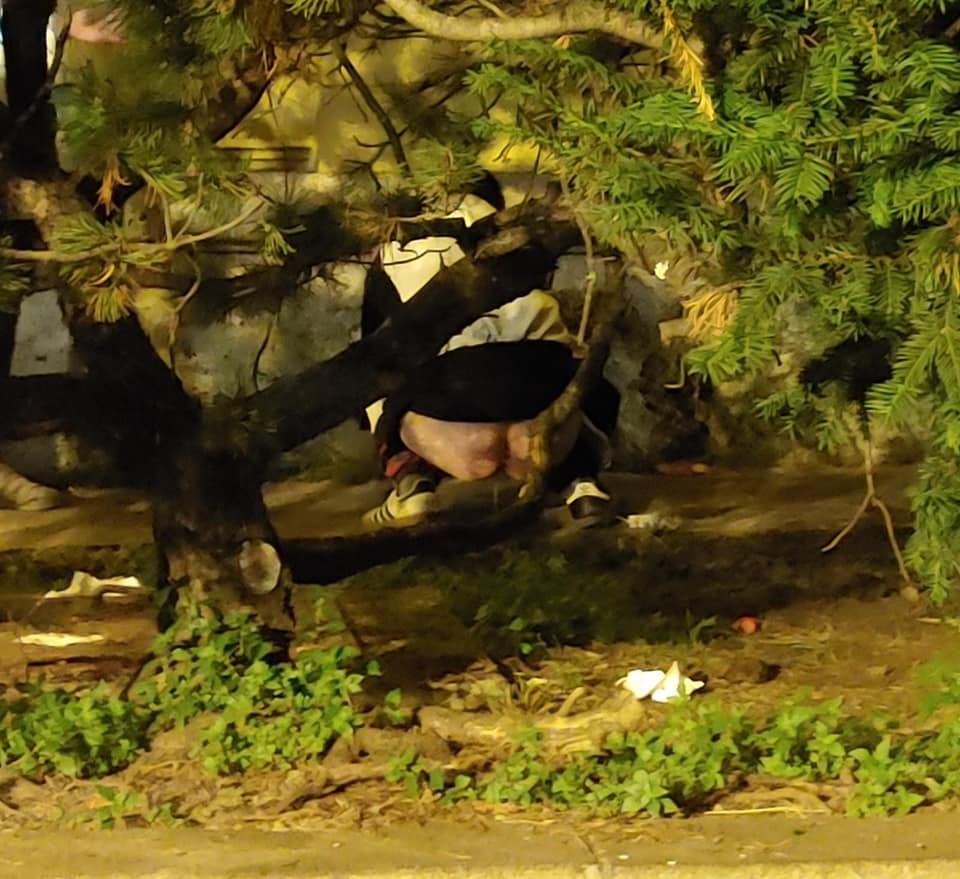
It was instantly noticeable when HNK afterhours lost its cool - all of the cool kids just stopped coming. What was once a representation of all the city's youth tribes dwindled to a hardcore few hundred of late-night drinkers with nothing better to do and no place else to go. The theatre and most of the music stopped.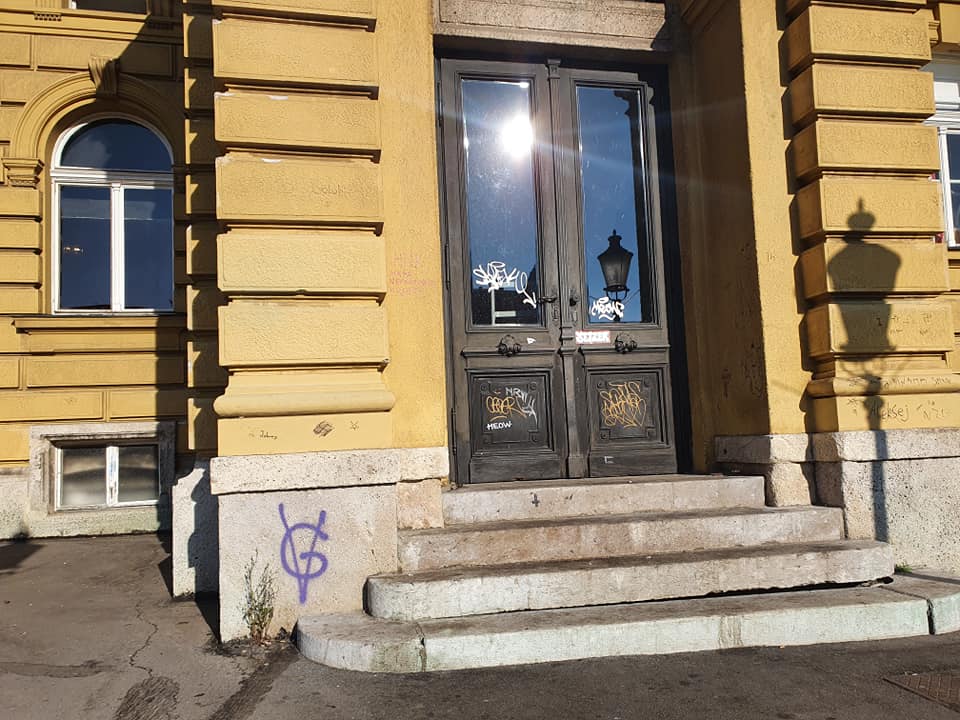
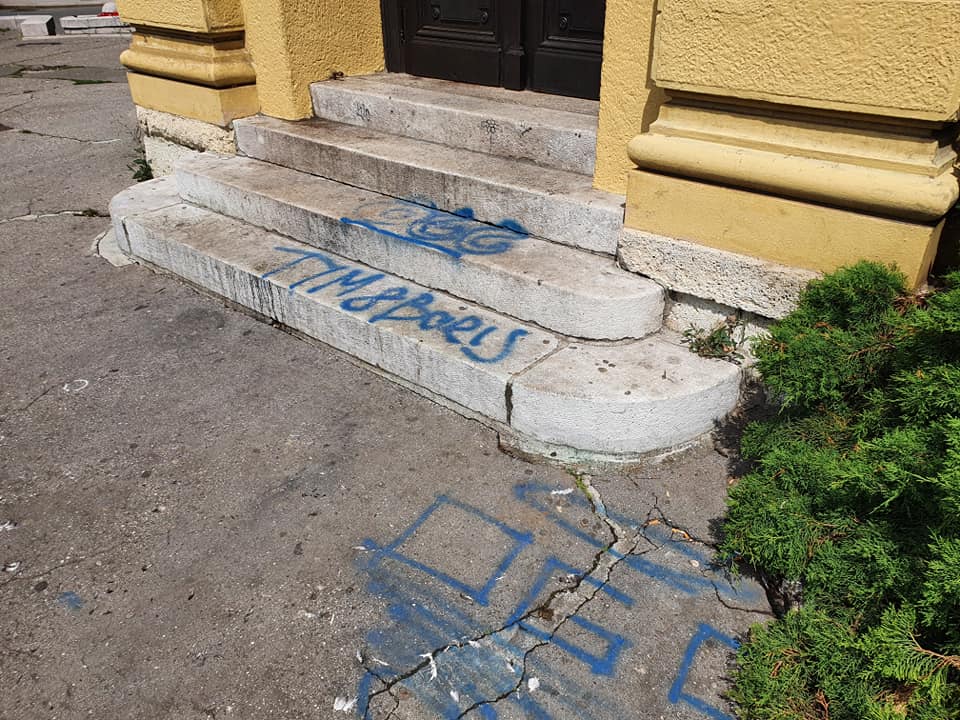
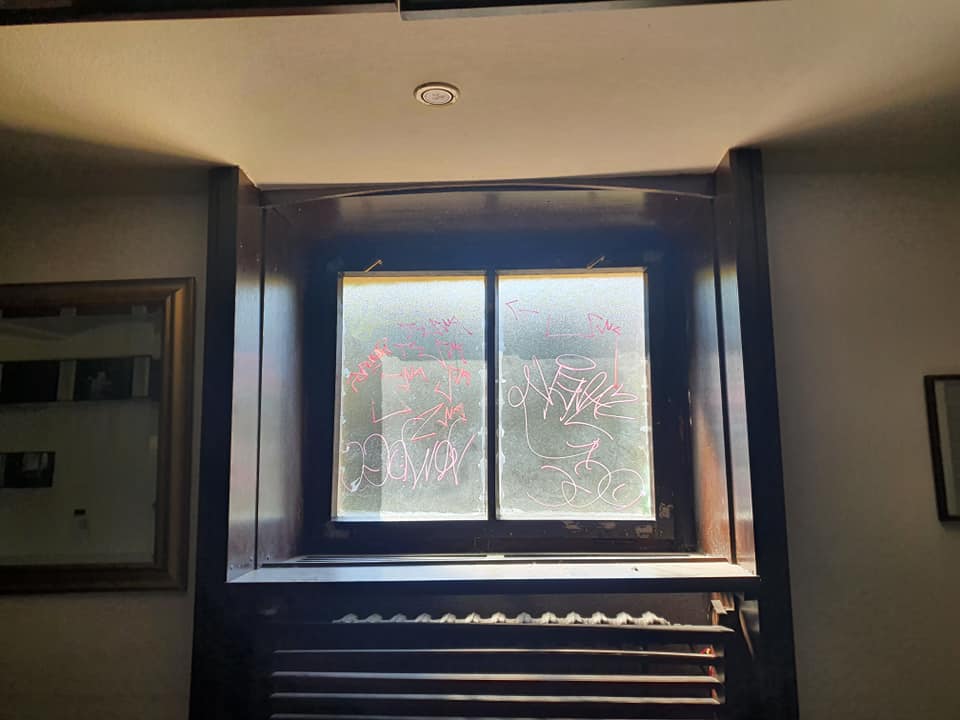
Then the violence, graffiti and vandalism began. The excessive drinking was one major sign of youth insecurity – people not entirely comfortable with themselves within large groups got drunk to ease their discomfort. Then, they threw up in the bushes. But the violence and graffiti were greater signs of insecurity and immaturity.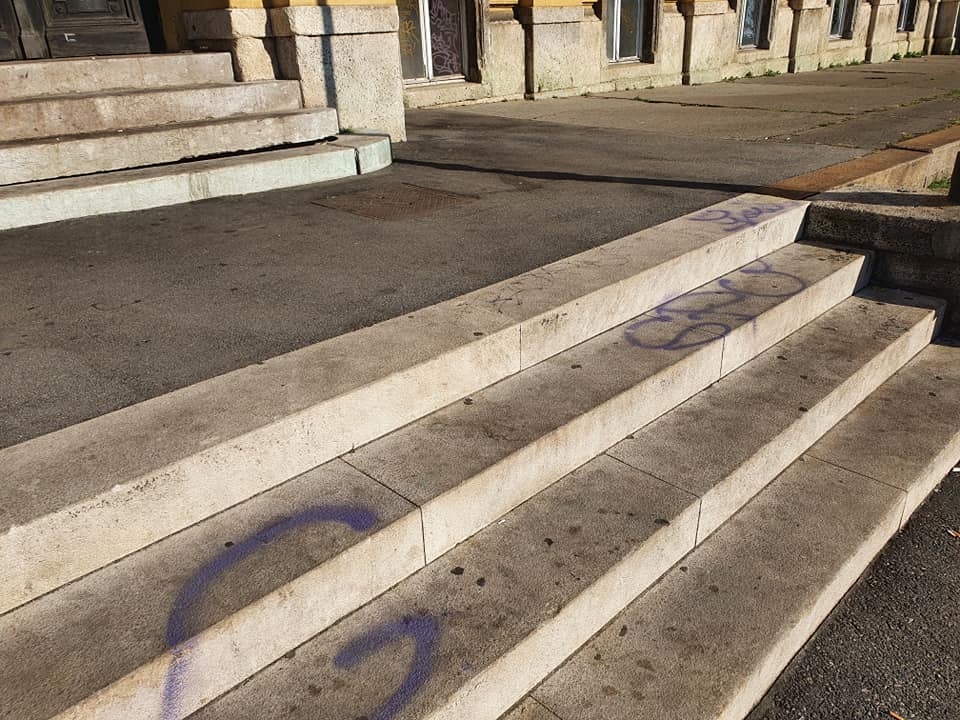
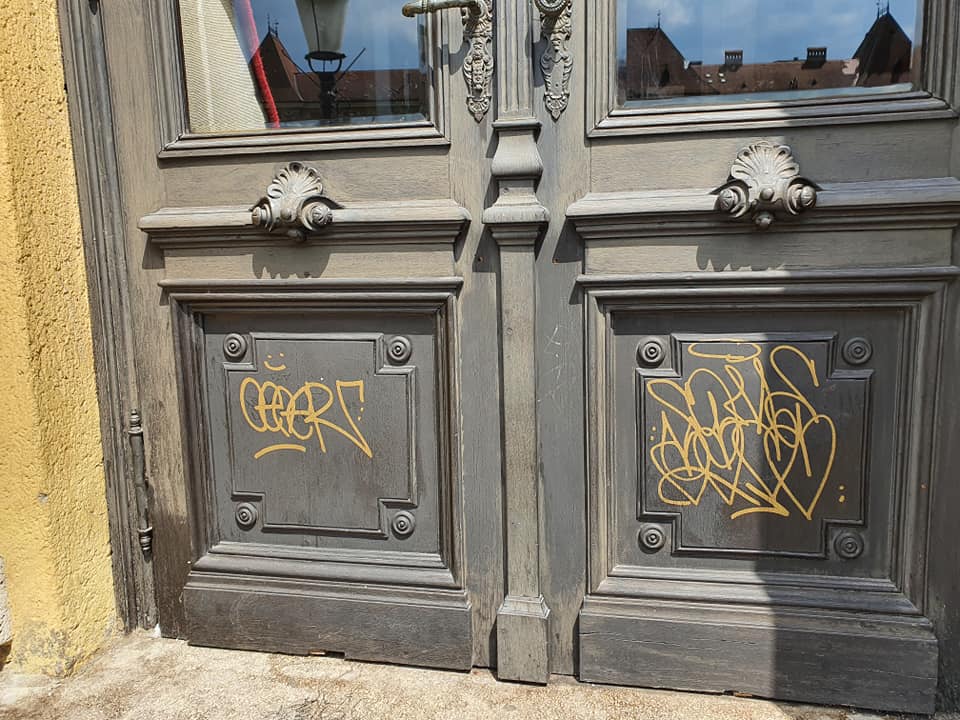
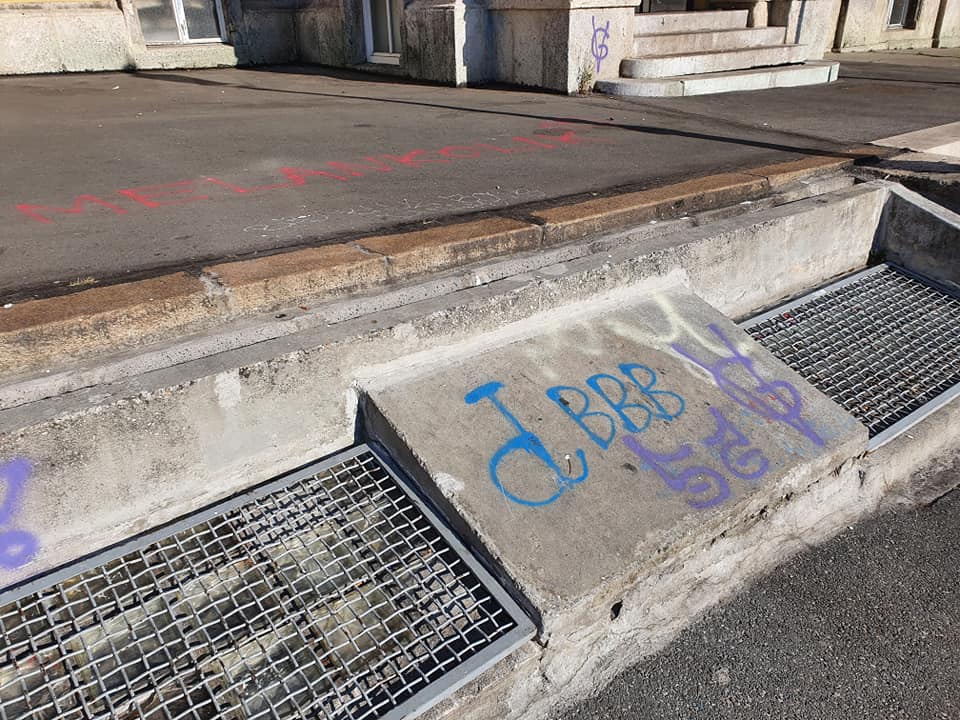
Like dogs urinating on street corners to mark their territory, mindless graffiti 'tags' appeared all over the Croatian National Theatre Zagreb – its steps, its windows, its antique doors. In an effort to leave a permanent mark, the insignificant few seemed determined to destroy everything that had once been joyful and good-natured about this gathering.
Zagreb police intervene when one drunken male started to physically abuse some of his peers. Present at the scene, this journalist commented to a friend that the police had acted bravely. The peer commented that the police had looked scared. They were surrounded by hundreds of spectators to the violence.
You can now guarantee there will be some violence outside the theatre on every weekend night. Zagreb police, who have shown remarkable patience and restraint throughout the whole phenomenon, sit far from the crowd and let the youngsters party. However, Zagreb Police Administration have said that from May 1 to September 30, the police intervened around the Croatian National Theatre Zagreb about 50 times, based on allegations of possible disturbance of public order and peace. In an effort to perhaps try and understand the frustrations of youths at this time, they have filed misdemeanor charges against only six people. This, despite a small, insecure and immature male section of the crowds flexing their muscles against smaller peers – or the police themselves – on a nightly basis. A small cabal of latecomers are ruining the reputation of a youth culture movement which deserves to be much better remembered.
 A young man shows the marks around both eyes that he received in an unprovoked attack at HNK afterhours on the weekend of 9 October 2020
A young man shows the marks around both eyes that he received in an unprovoked attack at HNK afterhours on the weekend of 9 October 2020
When you're young, it can be difficult to hear that the party is over. After you've had such a good time, you don't want to go home. You want the good times to last forever. But, this party is well and truly finished. HNK afterhours lost its cool many, many weeks ago. It is a rather sad remnant of something that was beautiful while it lasted. But, now it is time for the party to move elsewhere or for the attendees to go home. This beautiful building, its grounds and surrounding residents have played host for long enough. They each deserve a break.
The use of uncredited photographs in this article was granted on condition that the submitting photographers remain anonymous
For the latest travel info, bookmark our main travel info article, which is updated daily.
Read the Croatian Travel Update in your language - now available in 24 languages.
Mass Parties Outside Croatian National Theatre in Zagreb in Time of Corona
ZAGREB, October 11, 2020 - The Croatian National Theatre (HNK) in Zagreb has recently become a popular place for outdoor gatherings, where people gather every weekend, especially after midnight, when many bars close due to coronavirus measures.
Mass outdoor parties have been taking place in Republic of Croatia Square where the HNK building stands since May, when epidemiological measures were relaxed, and about 500 people gathered there last weekend as well.
Even after midnight when, according to epidemiological measures, all social life and entertainment in the city should stop, young people gather in groups, drink alcohol and listen to different genres of music.
Next to one of several speakers is 19-year-old Antonio, and asked why he is there, he told Hina that he currently has nowhere else to be.
HNK and social gathering
Sociologist Dino Vukusic from the Ivo Pilar Institute of Social Sciences commented on the diversity of young people gathering in front of the HNK building.
According to him, the HNK is not a new place of gathering, but this particular HNK was created during the pandemic. He thinks it is interesting that these spontaneous gatherings still persist.
There are many different people there now -- some belong to subcultures that have gathered outside the HNK before, and there also those who will, once night clubs reopen, go to night clubs, Vukusic said, adding that they are a very heterogeneous group of people.
The music and the style of the HNK gatherings are driven by the hedonism of young people and they are a cry for spending free time in a hedonistic way at a time like this, he said.
Residents request protection
The noise, mess and urinating that take place on green areas around the HNK have been disturbing the residents of Republic of Croatia Square, and they are calling for some protection despite the fact that there are only about ten of them.
One of the residents, Melita Kovacevic, who often cannot fall asleep because of the noise, told Hina that in the last few months, she and her neighbours had been reporting everything to the police.
Zagreb police told Hina that from May 1 to September 30, they intervened about 50 times around the HNK following reports of possible disturbing of the peace. However, they have filed misdemeanor charges against only six people.
The Cistoca city sanitation company told Hina that their employees had been intensively cleaning the HNK location and they had asked those gathering there to use bins to dispose of their litter, although there are just a few smaller bins around the square.
Zagreb to Host Two Ballet Spectacles from St Petersburg
May 8, 2018 - The audience in Zagreb can look forward to two exceptional ballet treats in June
Matej Meštrović Presents His Interpretation of Vivaldi's Four Seasons at HNK
Matej Meštrović will present his own interpretation of Vivaldi’s Four Seasons on Sunday, October 15 at the Croatian National Theater Zagreb.
Moscow Mossovet Theatre Performing in Zagreb in February
After a 10 year successful run in Moscow, a play based on A Streetcar Named Desire comes to HNK Zagreb on February 12.


